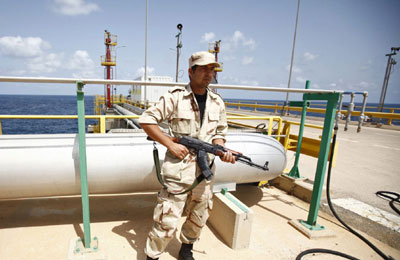
Rampant crime, anarchy in Libya
Tripoli, October 30, 2013
By Ulf Laessing and Ghaith Shennib
Gunmen rob millions from Libya's central bank. Boatloads of protesters storm an oil terminal like pirates. Tribesmen block a port - and contradict the prime minister when he tells the nation it will reopen soon.
Libyans have become accustomed to chaos in a country flooded with weaponry where militias and tribes call the shots, two years after Nato bombing helped rebels topple Muammar Gaddafi.
But the daylight robbery of $55 million from a Central Bank van suggested that Prime Minister Ali Zeidan's cabinet is losing the struggle to provide security and build state institutions.
Ten gunmen intercepted the van on Monday when it left the airport in Sirte, a former Gaddafi stronghold, snatching the cash flown in from Tripoli for the local central bank branch.
"The security situation is very bad in Sirte. When I heard about the robbery, I thought I was reading a detective story," said Ali Dhau, a former head of the city's local council.
Sirte, a central coastal town near Gaddafi's birthplace, has escaped the violence rife in cities such as Benghazi in the east, where assassinations and bombings are part of daily life.
But the city showcases the lawlessness engulfing postwar Libya after four decades of Gaddafi's quirky one-man rule.
The fledgling army has largely moved out of Sirte, unable to rein in armed bands or the Islamist militants of Ansar Al-Sharia which runs training camps nearby, residents say.
Unable to impose security here and in other cities, the government has co-opted former anti-Gaddafi rebels, putting them on the state payroll to guard public buildings or man checkpoints, nominally as part of state security forces.
In fact these gunmen report to their own commanders who have their own agendas. Some are close to Islamists like those who briefly grabbed Zeidan from his Tripoli hotel room this month in protest at a US raid to seize an Al Qaeda suspect.
Other militias pursue tribal interests or smuggle weapons, drugs and anything else that makes money.
OUTMUSCLED GOVERNMENT
Since his brush with kidnappers, Zeidan has appeared almost daily at news conferences or trade fairs to assure Libyans and Western partners that his government will not bow to militias.
But insecurity in the streets is exacerbated by infighting between supporters of Zeidan, a liberal, and his Islamist opponents in the General National Congress, or parliament.
"The government is very weak compared with other political forces, criminals and terrorists," said Libyan political analyst Rami Mussa.
Exploiting the power vacuum, protesters have shut down oil terminals and oilfields around the country. Oil output, the main source for the budget, is down to a fraction of the 1.6 million barrels a day Libya pumped before the uprising against Gaddafi.
Slumping oil revenue will make it harder for the government to pay militias, raise salaries and meet commitments next year.
Complicating Zeidan's task, the militias' varying objectives are all but impossible for a central authority to reconcile.
In the east, disfavoured in Gaddafi's time, tribes and other armed groups demand autonomy and oil wealth. Regional councils have sprung up which want to sell crude bypassing Tripoli.
Zeidan went on television on Monday to announce that protesters blocking Hariga port in Tobruk near the Egyptian border would reopen it within a week - and praised them as a movement whose actions were "for the sake of the nation".
He was sitting alongside a local official who also promised that oil exports would resume from Hariga.
Just hours later a tribe belonging to an alliance behind the blockade denied any deal had been reached and accused the government of being involved in oil sale corruption.
"The oil will stay shut down until there is an investigation by an unbiased body to look into...the theft of oil," the tribe said in a statement.
The idea of a federal state in which the eastern region of Cyrenaica, along with the west and southern Fezzan, would gain autonomy is popular in the east, but not elsewhere in Libya.
In the west, some protesters seek financial benefits - a challenge for the government when oil sales are shrinking. Others, such as minority Amazigh, or Berbers, want more constitutional rights, demands that are even harder to fulfill for a prime minister without real power.
Analyst Mussa said the government had failed to build good relations with tribes, saying the Hariga blockade typified their role as power-brokers in the desert nation and Opec member.
"These tribes stand as one on all issues," he said. - Reuters







